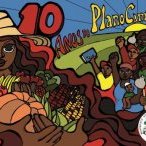English · Español

31 de octubre de 2014 | Entrevistas | Encuentro Monocultivos en América Latina | Acaparamiento de tierras | Bosques y biodiversidad | Soberanía Alimentaria
"Peasants are the strongest cell of resistance against any type of capital advance".
Even for a country as large as Brazil, the figures related to monoculture production are extremely high. The total surface area destined for agricultural production in the country amounts to 71 million hectares. Of these, between 30 and 31 million hectares are planted with soy, 15 million with maize and almost 10 million with sugarcane, according to data provided by the Brazilian Geography and Statistics Institute (IBGE).
This implies a sad record: Brazil is the world´s largest consumer of agrotoxics, averaging 5 liters per inhabitant. But also, the attacks by this monoculture model against the possibilities to reach food sovereignty is one of its main features. As Gilberto Schneider of the Small Farmers Movement (MPA) of Brazil said, most part of this production: "is not aimed at feeding the Brazilian people, but at generating profits for a few people".
Gilberto participated in the "Latin American Meeting on Large Scale Monoculture Plantations in Latin America", which took place in Honduras by mid September. According to the leader, the small-scale peasant production model is very different in many ways to the threatening monoculture plantations. For instance: "with 20 per cent of lands, peasants produce 70 per cent of the food consumed by the Brazilian people".
Among the threats implied by monoculture plantations according to the Brazilian leader, we can find the different impacts on biodiversity, not only on forests and ecosystems which are destroyed to give way to large plantations, but on the biodiversity of native seeds to produce food. In this way, the MPA has developed a strong native seeds recovery and production work in response to the advance of hybrid and genetically modified commercial seeds. This work, according to Gilberto "is the result of the resistance by peasant communities which started to recover their own seeds because their crops and their own food systems were being threatened".
In addition, indigenous communities have been the ones who´ve suffered more losses of lands due to the appearance of monoculture plantations, and with a strong use of violence: "these conflicts have caused the death of many leaders. Today, in Brazil, big corporations come with all these war tools to take the lands at any cost, because if they have to, they are willing to kill people".
About the elements that need to be strengthened in the resistance against monoculture plantations, Gilberto made reference to two important aspects: "one has to do with one of the weak areas of monoculture plantations: agrotoxics. We need to raise awareness on the population about the damage they cause".
The other has to do with emphasizing food sovereignty as a response to a model of polluting production which concentrates wealth: "Without monoculture plantations, without agrochemicals, what can we do? We can produce healthy food based on peasant communities, traditional knowledge, with native seeds and agroecological production".
Imagen: http://www.mpabrasil.org.br








